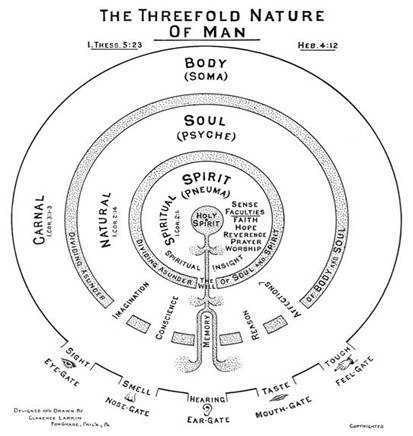
SUNDAY STUDY: Triune Man – Body, Soul and Spirit
THE TRIUNE MAN
Body, Soul and Spirit
Compiled from Clarence Larkin’s “The Spirit World” and Jack Kinsella’s Omegaletter
“So God created man in His own image; in the image of God He created him; male and female He created them.” Genesis 1:26-28
“But God has revealed them to us through His Spirit. For the Spirit searches all things, yes, the deep things of God. For what man knows the things of a man except the spirit of the man which is in him? Even so no one knows the things of God except the Spirit of God. Now we have received, not the spirit of the world, but the Spirit who is from God, that we might know the things that have been freely given to us by God.” 1 Cor. 2:10-12
Man was made in the image of God and God is a Trinity. Therefore, it follows that a triune God would create a triune man. The difference is that the Trinity is one God in three Persons, whereas a triune man is one person in three parts: body, soul, and spirit (1 Thess. 5:23).
“And the Lord God formed man of the dust of the ground, and breathed into his nostrils the breath of life; and man became a living being.” Gen. 2:7
This body did not have life. It was just formed, without life. The Word of God tells us that God “breathed into his nostrils the breath of life and man became a living soul (human being)”. The soul is what gives life to the body, and God’s “breathing into” him reveals a relationship between God and man. It is the crucial part of being human. The soul ‘animates’ and informs the body, so that even in the womb the fetus can be seen moving and performing living traits. Tertullian imagines God preparing a created form into which He can incarnate Himself ultimately in history.
Originally created in God’s image (having a spirit, being eternal) and after His likeness (sinless), the Spirit of God could live in Adam and Eve. “God is Spirit, and those who worship Him must worship in spirit and truth.” John 4:24
“Of every tree of the garden you may freely eat; 17 but of the tree of the knowledge of good and evil you shall not eat, for in the day that you eat of it you shall surely die.” (Gen. 2:16-17)
In the day they disobeyed God’s command, Adam and Eve did not lose either their bodies or their lives. So they must have died in another way… the death they immediately suffered “in the day” was a spiritual death. A perfect and holy God could not reside in sin, and so His Spirit was withdrawn. Aging and physical death would also eventually come upon them.
As the head and representative of the human race, “by one man sin and death entered the world” (Rom. 5:12), Adam’s original transgression implicated the human race as a whole. Sin was introduced as a power in human nature antagonistic to God, and this “infection of nature” has continued since. Death was a consequence of sin. This means that at physical death all of us would also have spiritual death, forever separated from God (1 Cor. 15:22; Rom. 3:23).
But God loves His Creation, and He immediately foretold how He would solve man’s separation from Himself: “And I will put enmity Between you and the woman, And between your seed and her Seed; He shall bruise your head, And you shall bruise His heel.” (Gen. 3:15)
“For God so loved the world that He gave His only begotten Son, that whoever believes in Him should not perish but have everlasting life.” (John 3:16)
“For if, by the trespass of the one man, death reigned through that one man, how much more will those who receive God’s abundant provision of grace and of the gift of righteousness reign in life through the one man, Jesus Christ!” (Rom. 5:17)
Both our physical (natural) bodies and “spirit” bodies are composed of ‘matter’. The matter of our natural bodies is adapted to this physical world, and the matter of our spirit bodies is adapted to the spirit world.
In this study, the term ‘natural’ man will hereafter mean every human person who has not been regenerated by the Holy Spirit. The term ‘man’ will mean every human person who has ever lived. All are born with a living body, a living soul, and a spirit (the spirit is dead to God, separated from Him, and therefore incapable of grasping the things of God).
“But the natural man does not receive the things of the Spirit of God, for they are foolishness to him; nor can he know them, because they are spiritually discerned.” (1 Cor. 2:14)
Having an ‘ungodly’ spirit, his “will” stands at guard and prevents the entrance of the Holy Spirit. Not until the will surrenders (through the power of the “sword of the Spirit”, the “Word of God”) does the Holy Spirit enter and take up residence in the spirit part of his nature. This happens when the “new birth”, the new life in CHRIST JESUS takes place. “Having therefore these promises, dearly beloved, let us cleanse ourselves from all filthiness of the flesh and spirit…” ( 2 Cor. 7:1)
Unless and until the spirit of natural man is ‘quickened’ (made alive) by the Holy Spirit, the Gospel is foolishness to him. The spirit still exists, but is not animated by the Spirit of God, so that the things of God, His will, His Word, His attributes are not being passed on to the soul. The person may seek and practice peace, purpose, love, and all the excellent moral qualities, even seek a ‘higher being’, blindly trying to make a true spiritual connection, but does not recognize the one true Creator God.
![]()
Think of man existing within 3 concentric circles: Body, Soul, Spirit. The soul animates the body, and the spirit animates the soul.

1. BODY (SOMA) Material. The outer ring is the body, the physical ‘shell’ that dies. The body has 5 senses: sight, smell, hearing, taste, and touch, through which it receives input from the material world. These 5 senses are the ‘gateways’ for both good and evil: eye-gate, nose-gate, ear-gate, mouth-gate, and feel-gate.
2. SOUL (PSYCHE) Immaterial. The center ring is our soul, or ‘psyche’, wherein dwells the natural man. It is unique to each individual. It is God-breathed and will continue to exist after the body dies, whether you are saved or not (Gen. 2:7). Every person you have ever met is a soul living in a body, and that soul will last forever.
The soul is also what the Bible figuratively calls the ‘heart’, the manifestation of desires, emotions, thoughts, imaginations, knowledge, beliefs, memory, consciousness. The world refers to it as your character, personality, the essence of who you are.
Simply put, the soul consists of the mind, will, and emotions.
Mind – your thoughts
Will – the means through which we choose from among the many desires present
Emotions – your feelings
The soul uses the body’s 5 senses as its agents in processing information, self-expression, communion with, and understanding of the outside world.
From these sensory inputs, the soul further processes through 5 more ‘gates’, which are: imagination, conscience, memory, reason, and affections.
“For the word of God is quick, and powerful, and sharper than any two-edged sword, piercing even to the dividing asunder of soul and spirit, and of the joints and marrow, and is a discerner of the thoughts and intents of the heart.” (Hebrews 4:12)
3. SPIRIT (PNEUMA) Immaterial. The innermost circle is the third element – the spirit. We are in His divine likeness – having a spirit. But not all persons have a living (quickened) spirit, indwelt by the Holy Spirit. This is the component of man to which God was referring in the Garden when He said, “for in the day that you eat of it you shall surely die.” (Gen. 2:17) On that day, Adam’s spirit ‘died’. It was a spiritual death.
The spirit receives impressions of outward and material things through the soul and body.
The spirit is that part of us that connects, or refuses to connect, to God.
The ‘senses’ of the spirit are faith, hope, reverence, prayer, and worship.
The spirit of man is ‘quickened’ (made alive by regeneration) when the Holy Spirit takes up residence (at salvation). “And when He had said this, He breathed on them, and said to them, “Receive the Holy Spirit.” (John 20:22)
It is the spirit of man that provides the spiritual insight, the gate through which the Holy Spirit communicates with us. “The Spirit Himself bears witness with our spirit that we are children of God.” (Romans 8:16) “But whoever is united with the Lord is one with Him in spirit.” (1 Cor. 6:17)
When one’s spirit is quickened, one gains a whole new set of insights: faith, hope, reverence and both the ability and the need to worship and pray.
That is not to say that the natural man doesn’t aspire towards obtaining the characteristics of the spirit – the spirit of man longs for these things. We are designed with a God-shaped hole in the soul – the unregenerate spirit – where the Holy Spirit belongs.
Most of us are spiritually ‘blind’. This refers to the sensory input we get from the center of our being (the inner circle), where our spirit is. At the center of the natural man’s, the spirit is dark, meaning it is totally blind to the things of God.
But, the natural man can be spiritual, in fact, the world is filled with spiritual people who are in communication with the spirit world. But they are not in communication with God. (1 Cor. 2:14)
If the spirit is not filled with God and the things of God, the soul can’t help but notice it is incomplete, and is constantly in search of something to fill that empty, aching gap. Some people fill it with drugs (imagination), others with sex (affections), others by replacing God with something else (reason), with false assumptions (conscience), or false experiences (memory). The 5 gateways to the soul are as far as they get, for reasons known only to themselves and God.
Paul tells us that: “So we are always confident, knowing that while we are at home in the body we are absent from the Lord. For we walk by faith, not by sight. We are confident, yes, well pleased rather to be absent from the body and to be present with the Lord.” When in the body, we are absent (materially) from the Lord. Our physical bodies are limited to its 5 sensory gates.
When we die, the soul and spirit separate from the body and from the body’s sensory input.
But, man has an eternal component that cannot die. That existence continues somewhere, either in heaven with God, or eternally separated from God in eternal torment (Rev. 20:14-15; Rev. 21:8).
You are written off as dead by God if you wrote Him off as dead in your life.
Actually, you aren’t separated from God at death – you were never joined to Him in life. But you continue to exist. ETERNALLY.
That is why He places such paramount emphasis on the Great Commission (Matt. 28:19-20). God knows what hell is really like, and He gave His own Son as a substitute sacrifice so that we could escape its torments.
†††
body soul and spirit, Clarence Larkin, death, Jack Kinsella, salvation, sin, triune God, triune man
